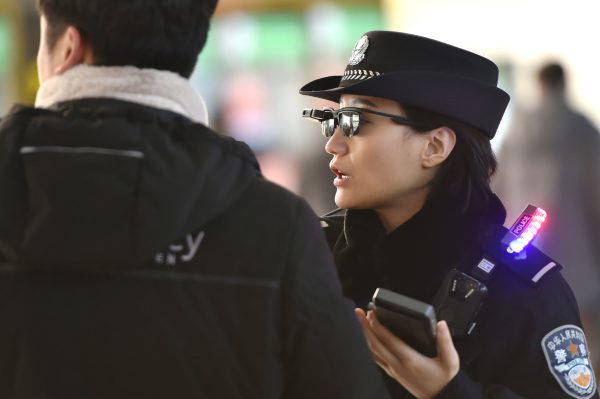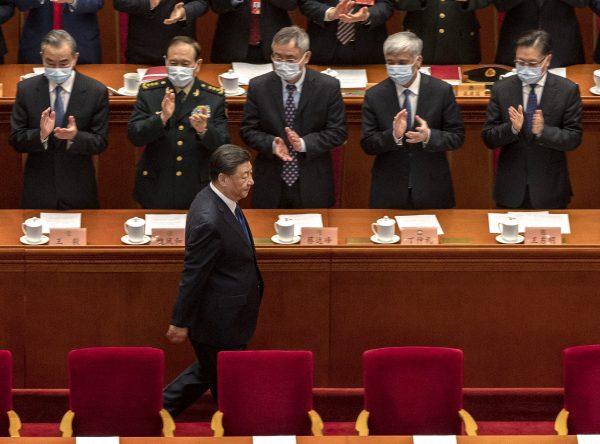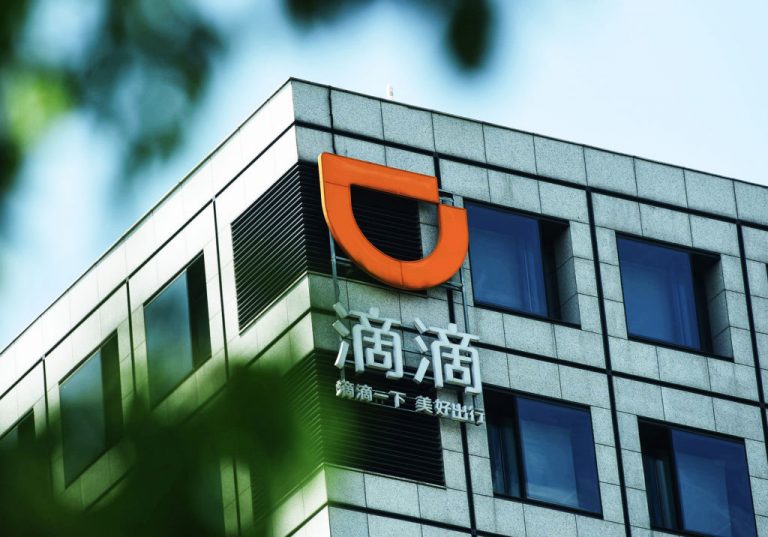News analysis
Chinese ride-hailing company Didi Global was hit with a $1.2 billion fine on July 21. The Cyberspace Administration of China (CAC) accused the company of violating laws on cyberspace security, data security, and personal information protection, including collecting excessive personal information from many of its nearly 600 million users. The fine signaled a conclusion of the official probe into Didi, which was launched about a year ago after the company listed on the New York Stock Exchange without Beijing’s blessings.
The Chinese authorities appeared to have telegraphed their action against Didi almost two months in advance. Li Daokui, an economist and former People’s Bank of China (PBoC) adviser, told a forum in speaking about Beijing’s tech sector crackdown on June 3 that “the political influence of internet companies is now nil” and that the worries of senior officials have been allayed. He added that China’s tech regulatory storm has ended and future policies would focus on restoring investor confidence.
On June 6, The Wall Street Journal reported that PRC regulators were concluding their investigation into Didi, citing people familiar with the matter. The Journal added that Didi and two other Chinese tech companies were expected to offer 1 percent equity stakes to the state and grant the authorities a direct role in corporate decisions.
A glance at the Chinese Communist Party’s calendar of key conclaves suggests that politics was one of, if not the leading factor behind the Xi leadership’s move to wrap up the Didi probe at this time.
READ MORE
- Xi Tightens Grip on China’s Police Force Ahead of 20th Party Congress
- Chinese Protesting Frozen Bank Accounts Just the Tip of the Iceberg in Beijing’s Widening Financial Crisis
- 3 Evergrande Real Estate Executives Asked to Resign Over Unstable Loans
Wary about Chinese Big Tech
Success
You are now signed up for our newsletter
Success
Check your email to complete sign up
The CCP’s Marxist-Leninist ideology and nonstop quest for absolute control sees it strive to put politics in command where possible in the regime. “East, west, south, north and center; the Party leads everything,” as Xi Jinping has said on multiple occasions.

Chinese tech giants represent a threat to CCP control given the nature of their business. Companies like Didi, Alibaba, and Tencent obtain vast amounts of personal information from their customers, some of which is sensitive. For instance, state mouthpiece Xinhua revealed in 2015 that it was working with Didi to analyze travel data of central government officials to track their overtime work status. Xinhua may have meant for the revelation to serve as propaganda about official “industriousness,” but it also indirectly pointed to the potential for tech companies to vie with the Party in surveilling and even influencing the Chinese populace.
Things would get even more problematic for the CCP if Chinese tech giants are forced to divulge their data to comply with listing requirements in foreign stock exchanges. In particular, the United States is requiring that Chinese companies and their auditors make detailed audit documents available or face delisting in 2024. The sensitive data that Didi possesses means that its move to get listed on the NYSE was very unlikely to have been approved by the CCP authorities. Therefore, Beijing would have interpreted Didi’s listing without having received the greenlight as a direct challenge to the Party and moved harshly against the company.
Finally, the Xi camp is wary of tech giants with links to its factional rivals. The Wall Street Journal reported in February 2021 that Beijing blocked Ant Group’s initial public offering in late 2020 partly because it did not want Xi Jinping’s rivals to line their pockets from the listing, and partly because the company was partaking in risky financial business while leaving state-owned banks to bear the bulk of the risk. Those identified by the Journal as Xi’s rivals include members of the Jiang faction like Jiang Zemin’s grandson Alvin Jiang and the son-in-law of Jia Qinglin.
- PREVIOUSLY REPORTED: Alibaba and Tencent Stocks Plunge After Latest Fines
- Xi Jinping Targets Jack Ma’s Alibaba
Jiang faction members also happen to serve on Didi’s board. Board member Chen Zhiyi is from Boyu Capital, the private equity firm of Alvin Jiang. Boyu Capital played a crucial role in helping Alibaba with its 2014 IPO in the United States. Meanwhile, Alibaba CEO Daniel Zhang happens to be another Didi board member. It cannot be ruled out that the probe into Didi and the heavy fine it received were aimed at placing on notice the Jiang faction and other political elites who are thinking about generating profits from the listing of Chinese tech giants at the expense of the CCP regime and the Xi leadership.
Political ‘truce’
Elite politics and political control are not the only reasons for Beijing’s conclusion of the Didi investigation. The Xi leadership is looking to revive the rapidly deteriorating economy, and needs to court and keep foreign investment in China. Foreigners are becoming increasingly hesitant to allocate capital to China due to rising geopolitical risks stemming from Beijing’s “no limits” friendship with Russia, the impact of Beijing’s “zero-COVID” policy, the tech sector crackdown, and other political factors.
That being said, elite politics appears to be the main reason why the Xi leadership has chosen now to end the Didi probe. Senior officials and Party elites are due in Beidaihe around mid-July to mid-August for their annual work-holiday. At the informal conclave, Party elites will very likely confab about Xi Jinping’s bid to break modern Party norms and extend his tenure at the 20th Party Congress, as well as consider his list of preferred personnel to take over key positions. By ending the Didi investigation around the Beidaihe period, Xi seems to be showing “goodwill” to his political rivals by signaling that further action will not be taken against them so long as they go along with his political agenda.
MORE ON CHINESE POLITICS
- China Fights Uphill Battle to Rescue Its Economy While Keeping ‘Zero-COVID’
- Xi Tightens Grip Over Chinese Propaganda Ahead of Key Conclaves
- China’s Epidemic Prevention Staff Getting Heatstroke From Sweltering Temperatures as Casualties Rise

Xi’s show of “goodwill” over Didi, however, does not necessarily mean an end of regulatory action in the tech sector or a permanent truce in factional struggle. Strong pushback against Xi’s 20th Party Congress political agenda at Beidaihe could result in further action to tackle the “disorderly expansion of capital” being taken against Didi’s political backers and the company. Other tech companies and financial institutions linked with Xi’s rivals could also be impacted depending on how Beidaihe turns out.
However, a lack of factional interference at Beidaihe does not translate into smooth sailing ahead for Xi Jinping either. The easing of regulatory crackdowns may not be enough to convince foreign investors about putting or keeping their money in China, especially as the global economy heads towards recession and the U.S. Federal Reserves’ anti-inflationary measures facilitate outflows. A sharp worsening of the economic situation, including the triggering of various debt and systemic financial risks, spells trouble for Beijing.
Further, the end of investigations into Didi may not do much to resolve the company’s troubles. Frightened investors may be hesitant to take stakes in Didi after accounting for the recent political turbulence. Meanwhile, two years of “zero-COVID” measures and the banning of Didi apps from domestic app stores for a year have severely impacted the company’s earnings. A scenario where Didi goes out of business in large part due to Beijing’s policies would be a huge black mark for Xi.
CCP leaders have long demonstrated a willingness to sacrifice economic results for political control. Xi is no different in this regard. But economic problems, when they snowball too far, become political problems as well. Xi’s rivals in the regime will undoubtedly look to exploit China’s steadily piling economic troubles to undermine his leadership before the 20th Party Congress.
Larry Ong is a senior analyst with New York-based political risk consultancy SinoInsider. He was part of the SinoInsider team that forecasted the 19th Party Congress and 2018 Two Sessions personnel reshuffles with a high degree of accuracy.














